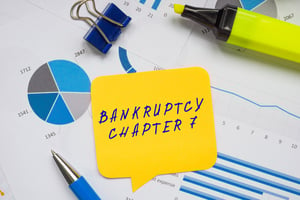
You may have heard of the principle of “Cross-Collateralization” and have wondered to yourself, what it means in regards to your Chapter 7 bankruptcy. How does it affect my Chapter 7 bankruptcy? Cross-collateralization clauses can be found in loan agreements you may sign with a lender. For instance, if you borrowed money from a bank to purchase an asset, the loan agreement you signed may have contained a cross-collateralization clause in it, creating a cross collateralized loan.
How Cross-Collateralization Clauses Work
What this clause does is, it makes the thing that you purchased, become collateral of the loan, and that collateral in turn, also secures another loan that you have with the same lender. To illustrate, let’s say you have a car loan and a credit card with the same bank, and the car loan agreement contains a cross-collateralization clause.
The clause makes the car secured by the car loan, as well as the credit card debt. In a Chapter 7 bankruptcy, you would have to keep making payments on the car and the credit card in order to keep the car. Likewise, let’s say you have a car loan and a mortgage by the same lender. In that case, you would have to continue making both the car loan payments and the mortgage payments, otherwise, the lender could repossess either.
The Impact of Cross-Collateralization by Credit Unions on Bankruptcy
You will often see cross-collateralization clauses in loan agreements with a credit union, as opposed to a large bank. This is because cross-collateralization clauses are often used by credit unions as a means to provide good terms to customers, and it also reduces their potential loss exposure. Even though a credit union’s offer for an unsecured loan may seem very low and appealing, it may be secured by collateral because of the cross-collateralization clause found within the loan agreement. In a Chapter 7 bankruptcy, unsecured debts are wiped out or discharged, completely.
The beauty of Chapter 7 bankruptcies is that it allows people to have a quick re-set button - the unsecured debt, such as credit card debt and medical bill debt, will all be discharged or wiped out, in approximately 3-4 months from the date your case is filed. However, cross-collateralization clauses in a loan agreement, will make an unsecured debt become a secured debt. This means that if you are faced with a cross-collateralization situation, the unsecured debt secures your collateral, such as your car, and that unsecured debt cannot be discharged in the bankruptcy if you want to keep your car. Reaffirming an auto loan during bankruptcy can have significant implications, as it may affect your credit reporting and the status of your loan in relation to your bankruptcy filing.
If you are faced with assets that are cross-collateralized and you are struggling with your payments on those assets, as well as the unsecured loan that secures them, it may be best to surrender your assets to the lender. For instance, if you have two cars that are cross-collateralized with a personal loan through the same lender, you may want to think about whether you really need both cars.
The Dilemma of Cross-Collateralized Assets
Is it worth the struggle and stress? Cross-collateralization can complicate the situation with debts owed by linking various debts to a single collateral, such as a car. If keeping up with the car payments and the unsecured loan payments is burdensome to you and your family, and is causing you stress or anxiety and is negatively affecting your daily life, then it may be best to surrender the cars in the bankruptcy and have the unsecured loan completely discharged all together through the Chapter 7 bankruptcy. It is important to remember that bankruptcy was designed as a remedy, to help those in challenging financial situations get in a better financial situation.
Cross-Collateralization and Chapter 7 Bankruptcy in Minnesota
Cross-collateralization can significantly impact your Chapter 7 bankruptcy in Minnesota. Having multiple loans with the same credit union can complicate your financial situation due to cross-collateralization clauses, making it difficult to manage or discharge debts during bankruptcy proceedings. This comprehensive guide will delve deeper into the intricacies of cross-collateralization, its effects on your bankruptcy case, and the strategic options available to Minnesota residents.
Unraveling the Complexities of Cross-Collateralization in Minnesota
Cross-collateralization is a common practice among credit unions and some banks in Minnesota. During the bankruptcy process, individuals often have experiences with a few banks, highlighting the complexities of closing accounts or marking them as included in bankruptcy. It involves linking multiple loans together, using the same collateral to secure different debts. For instance, your car loan might not only secure the vehicle itself but also your credit card debt or personal loan. This intertwining of debts can create unexpected consequences when filing for bankruptcy.
The Hidden Dangers of Cross-Collateralization in Chapter 7 Bankruptcy
While cross-collateralization may seem advantageous when obtaining loans, it can become a major obstacle in Chapter 7 bankruptcy. Debts that you thought were unsecured suddenly become secured, tying them to your assets. This means these debts are no longer automatically discharged in bankruptcy. To eliminate these debts, you may be forced to surrender the linked collateral, which could include your car, home, or other valuable possessions.
Understanding Minnesota's Bankruptcy Exemptions and Their Implications
Minnesota offers specific exemptions designed to protect certain assets from creditors in bankruptcy. These exemptions can be crucial in preserving your financial well-being. However, cross-collateralization can put these exemptions at risk. For example, if your car is fully exempt under Minnesota law but is cross-collateralized with a credit card debt, you may have to choose between keeping the car and discharging the credit card debt.
Strategic Options for Dealing with Cross-Collateralized Debt in Minnesota's Chapter 7 Bankruptcy
Facing cross-collateralized debt in bankruptcy doesn't mean you're out of options. Depending on your circumstances and the specific terms of your loan agreements, you may consider the following strategies:
-
Reaffirmation: If you want to keep the collateral and can afford the payments, you can reaffirm the debt. This involves signing a new agreement to continue paying the debt as if you hadn't filed for bankruptcy. However, reaffirmation should be approached with caution, as it can have long-term financial implications.
-
Redemption: This option allows you to buy back the collateral from the lender at its fair market value. If the collateral is worth less than the debt it secures, redemption can be a cost-effective way to keep the asset.
-
Surrendering: While surrendering the collateral may seem like a loss, it can be the best option in some cases. By giving up the asset, you eliminate the associated debt completely and avoid any further financial obligations.
-
Lien Stripping: In certain situations, if the value of the collateral is less than the amount owed on the primary loan, you may be able to "strip" the secondary lien through a legal process called lien stripping. This can help reduce your debt burden and protect your assets.
Making Informed Decisions with the Help of a Minnesota Bankruptcy Attorney
Navigating cross-collateralization in bankruptcy requires a thorough understanding of both bankruptcy law and Minnesota's unique exemptions. A skilled Minnesota bankruptcy attorney can analyze your specific situation, assess the impact of cross-collateralization, and guide you through the available options. They can help you make informed decisions that align with your financial goals and protect your assets.
Key Considerations for Minnesota Residents Facing Cross-Collateralization
Before making any decisions regarding cross-collateralized debt in bankruptcy, consider the following factors:
-
The value of the collateral: Is the collateral worth more than the debt it secures?
-
Your financial situation: Can you afford to reaffirm the debt, redeem the collateral, or make other arrangements?
-
Your long-term goals: Does keeping the collateral align with your overall financial strategy?
Don't Face Bankruptcy Alone
Cross-collateralization can add a layer of complexity to an already challenging situation. Don't navigate it alone. Seek the guidance of a qualified Minnesota bankruptcy attorney who can help you understand your rights, explore your options, and develop a personalized plan to achieve a fresh financial start.
By understanding the complexities of cross-collateralization and seeking professional guidance, you can make informed decisions that will protect your assets and pave the way for a brighter financial future. Remember, bankruptcy is a legal tool designed to help you overcome financial hardship, and with the right approach, you can emerge from it stronger and more financially secure.
Consult with an Experienced Bankruptcy Attorney Today
Bankruptcy may not always be a perfect fix. It may require making tough decisions, such as whether an asset needs to be surrendered, in order to discharge debt that has become too burdensome to manage. To determine whether surrendering your cross-collateralized assets may be best for you in a Chapter 7 bankruptcy, you should consult with an experienced bankruptcy attorney. See us at LifeBackLaw.com!
FAQs About Cross-Collateralization and Bankruptcy in Minnesota
1. What is cross-collateralization?
Cross-collateralization occurs when a lender uses one asset as collateral for multiple loans. For example, your car might secure not only your car loan but also your credit card debt with the same lender. This can make seemingly unsecured debts become secured, affecting your bankruptcy options.
2. How does cross-collateralization affect my Chapter 7 bankruptcy in Minnesota?
Cross-collateralization can complicate your Chapter 7 bankruptcy because it turns unsecured debts into secured ones. This means these debts might not be discharged in bankruptcy unless you surrender the associated collateral.
3. Can I still file for bankruptcy in Minnesota if I have cross-collateralized loans?
Yes, you can still file for bankruptcy even with cross-collateralized debts. However, your options may be limited. You might need to reaffirm the debt, redeem the collateral, or surrender it to discharge the associated debt.
4. What are my options if I want to keep the collateral but can't afford the payments?
If you want to keep the collateral but are struggling with payments, you might consider negotiating with the lender to modify the loan terms or explore alternative repayment options.
5. How do Minnesota's exemptions affect cross-collateralization in bankruptcy?
Minnesota offers exemptions that protect certain assets from creditors in bankruptcy. However, cross-collateralization can put these exemptions at risk. For instance, if your exempt car is cross-collateralized with an unsecured loan, you may be forced to choose between keeping the car and discharging the unsecured debt.
6. Should I consult with a bankruptcy attorney in Minnesota if I have cross-collateralized debts?
Absolutely! Consulting with an experienced Minnesota bankruptcy attorney is highly recommended if you have cross-collateralized debts. They can analyze your specific situation, explain the potential impact on your bankruptcy case, and guide you through the best course of action to protect your assets and achieve your financial goals.
7. Can I file for Chapter 13 bankruptcy instead of Chapter 7 if I have cross-collateralized debts?
Yes, you can file for Chapter 13 bankruptcy if you have cross-collateralized debts. Chapter 13 allows you to reorganize your debts and create a repayment plan, potentially allowing you to keep your assets while still addressing your financial difficulties.
8. Is there a way to remove the cross-collateralization from my loans?
In some cases, it might be possible to negotiate with the lender to remove the cross-collateralization from your loans. However, this is usually difficult to achieve and requires careful negotiation and legal expertise.
9. What are the potential consequences of surrendering cross-collateralized assets in bankruptcy?
Surrendering cross-collateralized assets means you lose the asset but also eliminate the associated debt. However, it can have negative impacts on your credit score and make it harder to obtain loans in the future.
10. Can a bankruptcy attorney help me avoid losing my cross-collateralized assets?
A bankruptcy attorney can explore various strategies to help you potentially keep your assets, such as negotiating with creditors, exploring lien stripping options, or restructuring your debts through Chapter 13 bankruptcy.





